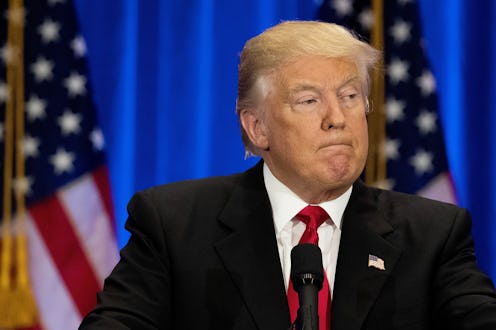News
Trump Doesn't Recall Saying He Has The Best Memory
According to NBC, Donald Trump claimed in December to have “the world’s greatest memory.” But according to newly released documents, Trump doesn’t remember saying that. Sad!
Back in November, Trump claimed that he saw “thousands and thousands of people” cheering the collapse of the World Trade Center on Sept. 11, 2001. To be clear, there’s no record that any such celebration ever took place. Still, when challenged on this claim, Trump stuck to his guns, explaining to NBC’s Katy Tur that he has “the world’s greatest memory.”
This claim came up again weeks later when Trump testifying in the Trump University lawsuit, according to documents released Wednesday. In a deposition, Trump claimed he couldn’t remember certain aspects of the case; this prompted the plaintiff’s attorney, Jason Forge, to reference the “world’s greatest memory” line.
“You’ve stated, though, that you have one of the best memories in the world,” Forge said.
“I don’t know,” Trump replied. “Did I use that expression?”
“Yes,” Forge answered.
The back and forth continued for a bit, and Trump eventually admitted that “I don’t remember saying that.” This strongly indicates that, contrary to his earlier claim, Trump does not have the greatest memory in the world.
The exchange was just one excerpt from much longer testimony that Trump gave in the lawsuit surrounding the business practices of his Trump University. While transcripts of his testimony have been released, lawyers for the plaintiffs want the judge in the case, Gonzalo Curiel, to release the video of Trump testifying. So do many media organizations, which have argued that the footage is pertinent to the presidential race.
In any case, the fact that Trump didn’t remember saying he had the world’s greatest memory suggests two things. First, that he doesn’t have a particularly good memory, let alone the “world’s greatest memory.” And secondly, that Trump takes the “shoot first, ask questions later” approach to speaking, essentially saying whatever comes into his head and sounds like the right thing to say.
We saw a similar dynamic play out in March. At a town hall, Trump was asked if, in a world where abortion was illegal, he would support punishing women who sought the procedure. Trump replied that he supported “some form of punishment,” thus prompting outrage from both pro-life and pro-choice camps. He eventually retracted the statement, and Trump surrogate Ben Carson explained it on the grounds that the real estate tycoon didn’t know the question was coming and hadn’t had enough time to think about it.
In both instances, the general lesson is the same: Think before you say things. Because sometimes, the things you say have consequences.
